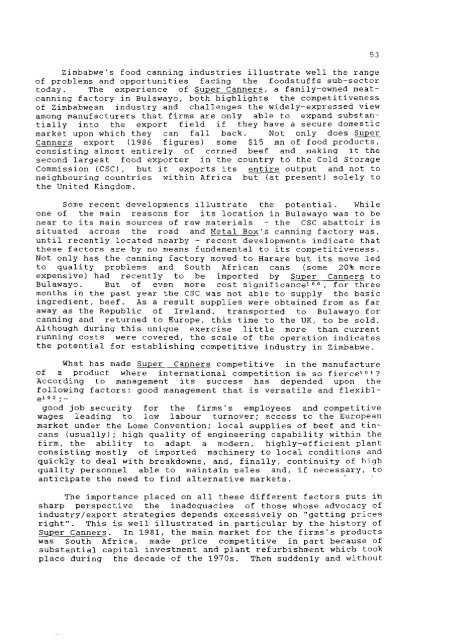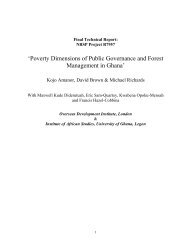Zimbabwe - Overseas Development Institute
Zimbabwe - Overseas Development Institute
Zimbabwe - Overseas Development Institute
Create successful ePaper yourself
Turn your PDF publications into a flip-book with our unique Google optimized e-Paper software.
<strong>Zimbabwe</strong>'s food canning i n d u s t r i e s i l l u s t r a t e w e l l the range<br />
of problems and o p p o r t u n i t i e s f a c i n g the f o o d s t u f f s sub-sector<br />
today. The experience of Super Canners, a family-owned meatcanning<br />
f a c t o r y i n Bulawayo, both h i g h l i g h t s the competitiveness<br />
of <strong>Zimbabwe</strong>an industry and challenges the widely-expressed view<br />
among manufacturers that firms are only able to expand substant<br />
i a l l y i n t o the export f i e l d i f they have a secure domestic<br />
market upon which they can f a l l back. Not only does Super<br />
Canners export (1986 figures) some $15 mn of food products,<br />
c o n s i s t i n g almost e n t i r e l y of corned beef and making i t the<br />
second l a r g e s t food exporter i n the country to the Cold Storage<br />
Commission (CSC), but i t exports i t s e n t i r e output and not to<br />
neighbouring countries w i t h i n A f r i c a but (at present) s o l e l y to<br />
the United Kingdom.<br />
Some recent developments i l l u s t r a t e the p o t e n t i a l . While<br />
one of the main reasons f o r i t s l o c a t i o n i n Bulawayo was to be<br />
near to i t s main sources of raw materials - the CSC a b a t t o i r i s<br />
s i t u a t e d across the road and Metal Box's canning f a c t o r y was,<br />
u n t i l r e c e n t l y located nearby - recent developments i n d i c a t e that<br />
these f a c t o r s are by no means fundamental to i t s competitiveness.<br />
Not only has the canning f a c t o r y moved to Harare but i t s move l e d<br />
to q u a l i t y problems and South A f r i c a n cans (some 20% more<br />
expensive) had r e c e n t l y to be imported by Super Canners to<br />
Bulawayo. But of even more cost significance"°°, f o r three<br />
months i n the past year the CSC was not able to supply the basic<br />
i n g r e d i e n t , beef. As a r e s u l t supplies were obtained from as f a r<br />
away as the Republic of I r e l a n d , transported to Bulawayo f o r<br />
canning and returned to Europe, t h i s time to the UK, to be sold.<br />
Although during t h i s unique exercise l i t t l e more than current<br />
running costs were covered, the scale of the operation i n d i c a t e s<br />
the p o t e n t i a l f o r e s t a b l i s h i n g competitive i n d u s t r y i n <strong>Zimbabwe</strong>.<br />
What has made Super Canners competitive i n the manufacture<br />
of a product where i n t e r n a t i o n a l competition i s so f i e r c e ' " ' ?<br />
According to management i t s success has depended upon the<br />
f o l l o w i n g f a c t o r s : good management that i s v e r s a t i l e and f l e x i b l -<br />
good job s e c u r i t y f o r the firms's employees and competitive<br />
wages leading to low labour turnover; access to the European<br />
market under the Lome Convention; l o c a l s u p p l i e s of beef and t i n -<br />
cans ( u s u a l l y ) ; high q u a l i t y of engineering c a p a b i l i t y w i t h i n the<br />
f i r m , the a b i l i t y to adapt a modern, h i g h l y - e f f i c i e n t plant<br />
c o n s i s t i n g mostly of imported machinery to l o c a l conditions and<br />
q u i c k l y to deal with breakdowns, and, f i n a l l y , c o n t i n u i t y of high<br />
q u a l i t y personnel able to maintain sales and, i f necessary, to<br />
a n t i c i p a t e the need to f i n d a l t e r n a t i v e markets.<br />
The importance placed on a l l these d i f f e r e n t f a c t o r s puts i h<br />
sharp perspective the inadequacies of those whose advocacy of<br />
industry/export s t r a t e g i e s depends e x c e s s i v e l y on " g e t t i n g p r i c e s<br />
r i g h t " . This i s w e l l i l l u s t r a t e d i n p a r t i c u l a r by the h i s t o r y of<br />
Super Canners. In 1981, the main market f o r the firms's products<br />
was South A f r i c a , made p r i c e competitive i n part because of<br />
s u b s t a n t i a l c a p i t a l investment and plant refurbishment which took<br />
place during the decade of the 1970s. Then suddenly and without
















